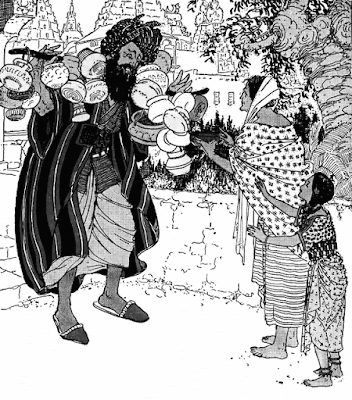Reading Notes Week 10: Jakarta Tale Part A
I chose the Merchant of Seri jakarta for this week's story.
There was a young girl and grandmother who once had money but were now poor. Merchants used to come by their house, selling and buying items. The granddaughter asked the grandma if she could sell a bowl they had because it was never used. The grandmother had kept the bowl despite being so poor because of the nostalgia of her late husband eating from it. Despite this, she was willing to sell it to take care of her granddaughter.
The first merchant she tried to sell it to was greedy. The grandma and granddaughter did not know the price of their bowl, and he knew this, so he told them it was worthless and threw it on the ground. He did this hoping he could try to buy it for cheaper later and sell it at a higher price for a better profit. He left after this. A second merchant came, and was more kind. The grandma basically said I know this is worthless but please try to buy it for something, as she needs the money for her granddaughter. The merchant insisted it was wroth more, and paid them a fair price for their golden bowl.
The greedy merchant returned only to find out it was sold to someone else. He was upset, and tried chasing after the kind merchant with no luck.
My notes: I love the jakarta tales because they are easy to read. I chose this particular one because I thought it had many issues, which I could possibly base a story retelling on. These are it:
1. Did the grandma not remember the bowl was a golden bowl and expensive? The story made it seem she did not know it's worth. I know she is old, may have forgotten, or the husband bought it (story never specified) but I feel like even if they were rich she might know-especially if she is poor and sold most of their items, I'm sure she would have had some kind of appraisal.
2. Why is the granddaughter telling the grandma to sell the bowl? I understand if there is no food on the table, but if they have lost everything, I think the grandma keeping the bowl obviously means it has sentimental value. I don't think this fact is a "hole" in the story, just kind of selfish and dense of the girl.
3. I know the story is trying to glorify telling the truth, but is a merchant really the best example? I feel as though this isn't plausible. As business men, when your living is based on unstable profit commission, are you really going to be able to sustain a business by being just? The grandma did not know it's worth, so offering less money is not completely wrong. I wouldn't want it to happen to me, but at the same time, if I was not aware, I would have to pay the price for my ignorance. That's life.
4. I thought gold is supposed to bend easily. If the grandma was rich enough before to buy golden dinnerware, she surely had some knowledge about gold. She would notice how bent the bowl was when it was thrown and put two and two together.
5. Why did the greedy merchant leave? I think if a buyer knows the seller is unaware of how valuable their item is, they would try to snatch that deal before anyone else pounces on it. He knows she is trying to sell it. Does he really think his one comment will make her so discouraged she won't try to sell it, when that valuable of an item is at stake? If she thinks it is so invaluable, she might try to sell it to someone even cheaper? At that point, he deserves what happened not because he lied, but because of his stupidity as a merchant.
6. I still think the story has a sweet message about honesty. I liked the innocence and naiveness from the grandma/daughter.
Bibliography:
Title: The Merchant of Seri
Author: Ellen Babbit, 1912
The story can be accessed by clicking this.
(This image is a depiction of one of the merchants with the grandmother and granddaughter mentioned. The image can be sourced here.)
There was a young girl and grandmother who once had money but were now poor. Merchants used to come by their house, selling and buying items. The granddaughter asked the grandma if she could sell a bowl they had because it was never used. The grandmother had kept the bowl despite being so poor because of the nostalgia of her late husband eating from it. Despite this, she was willing to sell it to take care of her granddaughter.
The first merchant she tried to sell it to was greedy. The grandma and granddaughter did not know the price of their bowl, and he knew this, so he told them it was worthless and threw it on the ground. He did this hoping he could try to buy it for cheaper later and sell it at a higher price for a better profit. He left after this. A second merchant came, and was more kind. The grandma basically said I know this is worthless but please try to buy it for something, as she needs the money for her granddaughter. The merchant insisted it was wroth more, and paid them a fair price for their golden bowl.
The greedy merchant returned only to find out it was sold to someone else. He was upset, and tried chasing after the kind merchant with no luck.
My notes: I love the jakarta tales because they are easy to read. I chose this particular one because I thought it had many issues, which I could possibly base a story retelling on. These are it:
1. Did the grandma not remember the bowl was a golden bowl and expensive? The story made it seem she did not know it's worth. I know she is old, may have forgotten, or the husband bought it (story never specified) but I feel like even if they were rich she might know-especially if she is poor and sold most of their items, I'm sure she would have had some kind of appraisal.
2. Why is the granddaughter telling the grandma to sell the bowl? I understand if there is no food on the table, but if they have lost everything, I think the grandma keeping the bowl obviously means it has sentimental value. I don't think this fact is a "hole" in the story, just kind of selfish and dense of the girl.
3. I know the story is trying to glorify telling the truth, but is a merchant really the best example? I feel as though this isn't plausible. As business men, when your living is based on unstable profit commission, are you really going to be able to sustain a business by being just? The grandma did not know it's worth, so offering less money is not completely wrong. I wouldn't want it to happen to me, but at the same time, if I was not aware, I would have to pay the price for my ignorance. That's life.
4. I thought gold is supposed to bend easily. If the grandma was rich enough before to buy golden dinnerware, she surely had some knowledge about gold. She would notice how bent the bowl was when it was thrown and put two and two together.
5. Why did the greedy merchant leave? I think if a buyer knows the seller is unaware of how valuable their item is, they would try to snatch that deal before anyone else pounces on it. He knows she is trying to sell it. Does he really think his one comment will make her so discouraged she won't try to sell it, when that valuable of an item is at stake? If she thinks it is so invaluable, she might try to sell it to someone even cheaper? At that point, he deserves what happened not because he lied, but because of his stupidity as a merchant.
6. I still think the story has a sweet message about honesty. I liked the innocence and naiveness from the grandma/daughter.
Bibliography:
Title: The Merchant of Seri
Author: Ellen Babbit, 1912
The story can be accessed by clicking this.




Comments
Post a Comment